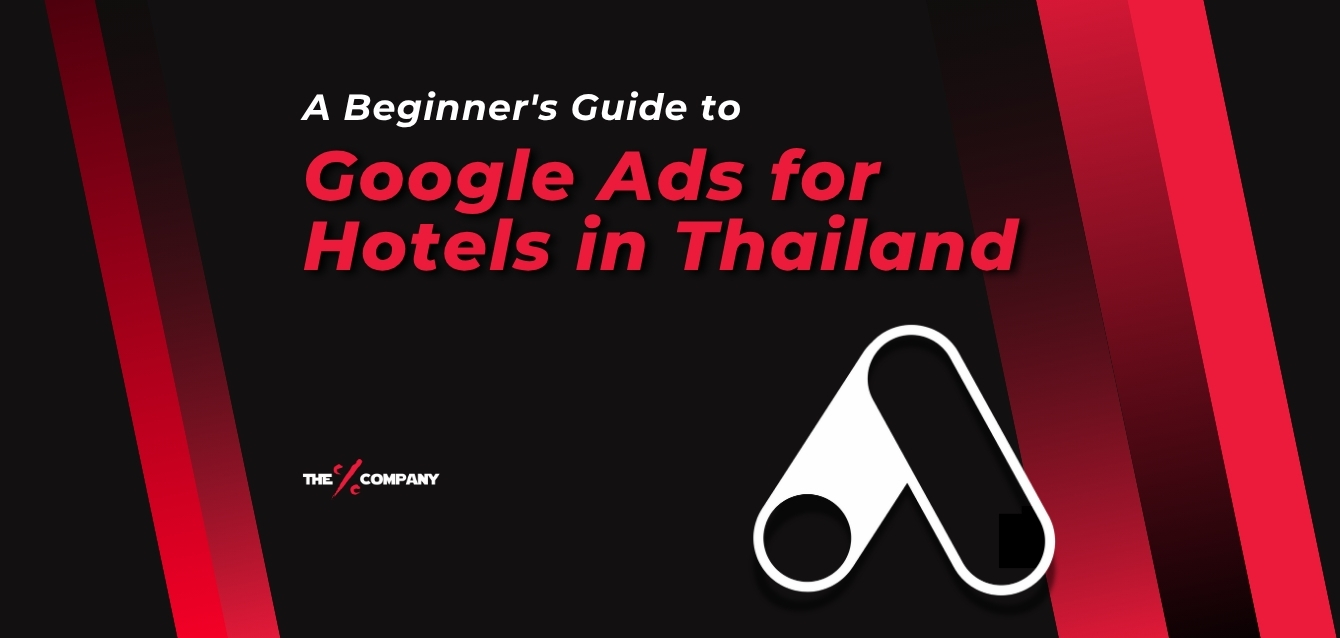From the bustling beaches of Phuket to the serene hills of Chiang Mai, every hotelier is looking for an edge. Whether you’re running a boutique villa, a luxury resort, or a chain of serviced apartments, one thing is clear: online visibility is everything.
Google Ads, particularly Google Hotel Ads, have become an essential tool for hotels looking to drive direct bookings, increase brand awareness, and compete effectively with our ‘frenemies’, OTAs like Booking.com, Expedia, Ctrip and Agoda. If you’re new to Google Ads or unsure how to optimize your campaigns for the Thai hotel market, this beginner’s guide is for you.
Why Google Ads Matter for Hotels in Thailand
Thailand is one of the most visited countries in the world, welcoming millions of tourists annually. With such high demand comes high competition. Standing out in Google Search is no longer just a nice-to-have, it’s a necessity. Here’s why Google Ads is so critical for Thai hotels:
- Visibility where it matters most: Google is the first place most travelers start their hotel search.
- Direct booking potential: Well-optimized ads help you reduce reliance on OTAs, saving you significant commission fees.
- Flexible targeting: Reach travelers in specific markets (e.g., France, Singapore, the UK) or traveling for specific dates.
- Real-time ROI tracking: Know what you’re spending and what you’re earning, down to each baht.
Understanding the Types of Google Ads for Hotels
When it comes to advertising your hotel, Google offers multiple campaign types. Here’s a breakdown of just some of the key options relevant to hotels:
1. Google Hotel Ads
These are the listings you see directly on Google Search or Google Maps when someone searches for hotels. They show room availability, prices, images, and a link to book, either via your direct website or through an OTA.
Why they’re powerful: They appear prominently in travel-related searches and are designed to drive bookings. If your hotel is connected through a Hotel Center feed (typically via a connectivity partner or PMS/booking engine), you can list your rates and availability directly.
Note: The Percentage Company is a certified Google connectivity partner. Ask us for details.
2. Search Campaigns
These are the traditional Google Ads you see on top and side of search results. They’re text-based and driven by keywords (e.g., “best beachfront hotel in Phuket”).
Best for: Promoting your brand, specific offers, long-stay packages, or targeting non-Hotel Ads search queries (like “pet friendly villas in Chiang Mai”).
3. Performance Max Campaigns
These are all-in-one campaigns that run across Google Search, YouTube, Gmail, Display, and Discover. Performance Max uses AI and automation to optimize delivery across Google’s full suite of ad placements.
Ideal for: Hotels with strong creative assets looking to reach users across multiple channels. They work well for seasonal promotions, staycation deals, or launching a new property.
4. Display & YouTube Ads
Display ads (banners) and YouTube video ads are great for building brand awareness and retargeting past visitors. These are best used as part of a broader strategy.
Setting Up Your First Hotel Ad Campaign: A Step-by-Step Introduction
If you’re just getting started, here’s a simplified walkthrough of launching your first campaign:
Step 1: Define Your Goals
Are you trying to get more direct bookings? Promote a special package? Increase brand awareness in a new market? Clear goals will inform your campaign setup, budget, and creative direction.
Step 2: Choose Your Campaign Type
For most beginners, start with either a Search Campaign or Hotel Ads if your booking engine is integrated like The Percentage App Booking engine. If your hotel isn’t yet eligible for Hotel Ads, The Percentage Company can assist with getting your feed live if you wish to use our advanced booking platform.
Step 3: Keyword Research
Use Google Keyword Planner to identify search terms relevant to your hotel. Focus on a mix of:
- Branded terms: “HOMA Phuket,” “Chiang Mai Boutique Resort”
- Location + intent: “Best hotels in Rawai Beach,” “Phuket monthly rentals”
- Niche filters: “Pet-friendly villas Chiang Mai,” “Eco resort Koh Lanta”
Step 4: Create Compelling Ads
Your ad copy / content should:
- Highlight your USPs (e.g., rooftop pool, fitness center, pet-friendly)
- Mention your location clearly
- Include a call to action (“Book direct for best rate!”)
- Use ad extensions (sitelinks, callouts, location)
Step 5: Set Up Conversion Tracking
You must install Google Ads conversion tracking and integrate via Google Tag Manager / Google Analytics (GA4). This lets you track bookings, revenue, and ROAS (Return on Ad Spend).
Step 6: Optimize Landing Pages
Your website needs to be fast, mobile-friendly, and optimized for conversions. A slow or confusing booking experience can lead to high ad spend and low ROI.
Budgeting & Bidding: How Much Should You Spend?
Your ideal budget depends on factors like:
- ADR (Average Daily Rate)
- Booking conversion rate
- Average length of stay
- Target CPA (Cost Per Acquisition)
Example: If your ADR is 1,500 THB and your average stay is 5 nights, your booking is worth ~7,500 THB. If you aim to spend no more than 10% of booking value, your CPA target should be 750 THB.
The Percentage Company ads experts can help you set realistic CPA and ROAS goals tailored to your hotel and market segment.
Tips to Maximize Your Google Hotel Ads Performance
1. Feed Accuracy is Crucial: Your room rates, availability, and policies must be accurate at all times. Discrepancies between your ad and actual rates will kill conversions.
2. Use Rate Parity to Your Advantage: Offer exclusive benefits (e.g., free breakfast, late check-out) for direct bookings to compete with OTAs without undercutting them.
3. Leverage Ad Scheduling: Run ads when your audience is most active. For example, targeting the Australian market? Schedule during their evening browsing hours.
4. Geo-Target Strategically: Don’t waste money on irrelevant traffic. Focus on your key source markets. Consider splitting campaigns by language (e.g., English, Russian, Thai).
5. Use Remarketing Lists: Stay top of mind by retargeting website visitors who didn’t convert. This can drastically improve ROI when done correctly.
Common Pitfalls to Avoid
- Not tracking conversions: Flying blind with no metrics will lead to wasted budget.
- Overreliance on broad match keywords: These attract irrelevant traffic
- Low-quality landing pages: High bounce rates = poor ad performance.
- Ignoring mobile users: Most hotel searches are now mobile-first.
- One-size-fits-all campaigns: Segment your ads by market, device, or booking intent.
Why Work with The Percentage Company?
Managing Google Ads for hotels is part art, part science – and entirely time-consuming. At The Percentage Company, we specialize in performance marketing for hotels across Thailand, from boutique resorts to large serviced apartment brands.
Here’s what we bring to the table:
- Deep hospitality expertise in Thai markets
- Certified Google Ads professionals
- In-house creative team for banners, landing pages, and copy
- Advanced tracking setup via Google Tag Manager
- Full-funnel strategy (acquisition, remarketing, upsells)
- Localized campaign execution across English, Thai, and Russian markets
Whether you’re starting from scratch or looking to improve your existing results, we’re here to help drive real ROI – not just clicks.
Ready to Boost Direct Bookings with Google Ads?
If you’re serious about driving more bookings and reducing OTA commissions, it’s time to harness the power of Google Ads the right way. Let The Percentage Company manage your campaigns, so you can focus on hosting your guests. Contact us today for a free consultation and audit of your current advertising setup.

Written By: Edward Kennedy
Co-Founder & Director at The Percentage Company. I started working on websites in 1997 and have been a full-time techie since 2001. I’m committed to leveraging the latest technologies and digital marketing techniques to drive efficiency & improve online sales for our hotel clients. I have a 20+ year track record of success in growing independent hospitality & real estate brands.






